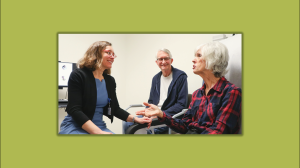A True Gift
Jeanne Caldwell didn’t have Alzheimer’s disease, yet she knew firsthand the devastation it can cause. For 11 years she cared for her mother who had the disease. After her mother’s death in 2015, Caldwell was determined to do what she could to make sure other families did not have to endure the hardships of caring for a loved one with Alzheimer’s.
She was moved to make a planned gift to support Alzheimer’s disease research at Duke. Caldwell, a retired high school teacher who lived in Charlotte, North Carolina, passed away in 2019, leaving $2.5 million to Duke. The gift established the Mary Elizabeth Schrum Caldwell Research Fund, named in honor of Caldwell’s mother.
“She was a difference maker,” says Tom O’Neal, Caldwell’s friend and neighbor of 38 years. “Her hope was that other families wouldn't go through what she experienced.”
Caldwell’s gift is making a difference to researchers like Kim G. Johnson, MD, whose work could change the way doctors diagnose and treat Alzheimer’s disease and ultimately improve lives.
Recently, Duke partnered with UNC to establish the Duke-UNC Alzheimer’s Disease Research Collaborative. Made up of experts who are focused on discovery projects that have the best chance of preventing or treating Alzheimer’s and related dementias, the collaborative is organized into several core areas, including clinical, outreach, data management, and research education.
Along with other researchers in the clinical core, Johnson, division chief for memory disorders at Duke, is focused on enrolling patients in a long-term study on cognition and aging. The study will collect information about participants’ vision, hearing, motor speed, and other factors as they age. Participants will also undergo neuropsychological testing, receive an MRI scan, and have proteins in their cerebral spinal fluid measured. The study will examine how these parameters determine who develops Alzheimer’s disease and who doesn’t. With a better understanding of the biological processes involved with Alzheimer’s disease, researchers will be able to diagnose the disease earlier and develop better treatments.
The study will include people ages 45 to 80 who have a family history of Alzheimer’s disease and are having a decrease in cognition as well as those who have normal cognition. In addition, a younger cohort made up of participants ages 25 to 44 will be compared to the older group of patients. The researchers hope to enroll a total of 540 patients.
Johnson, who is also an assistant professor of psychiatry and behavioral sciences, says all the participants, much like Caldwell, are offering a gift to Duke and to the field of Alzheimer’s disease research. “I tell them volunteering to enroll in the study is a true gift to us, the gift of knowledge and the gift of their time,” she says. “They’re giving and partnering with us to further the understanding of the mechanism behind Alzheimer's disease and possibly finding a treatment.”
Aside from providing researchers with critical information about Alzheimer’s disease, the study will also give participants useful information about their own genetic and biologic risk. Researchers determine risk by measuring biomarkers in participants’ cerebral spinal fluid obtained through a lumbar puncture and by doing a genetic blood test.
Johnson says determining whether someone has increased genetic risk has important value, especially for younger people and those whose parents have Alzheimer's disease. “If somebody knows they have this fixed increased genetic risk, they might choose to do things differently to affect lifestyle risk factors, which can be modified over the course of their life,” she says. “Whereas for the person who already has Alzheimer's disease, it's too late to have any effect on those lifestyle risk factors.”
Support from donors like Caldwell has been crucial to the collaborative. It gives them the foundation they need to expand the study and apply for funding from the National Institutes of Health to gain the distinguished designation of an Alzheimer’s Disease Research Center.
Next, Johnson and her colleagues hope to begin examining how Alzheimer’s disease affects women during menopause. They also hope further donor support will allow them to begin testing participants for blood-based plasma biomarkers rather than conducting the cerebral spinal fluid biomarkers testing that they currently use. Blood-based testing is less invasive than the lumbar puncture required to obtain cerebral spinal fluid and will give researchers insights into whether Alzheimer’s disease risk can be determined with a simple blood test.
In addition to Alzheimer’s disease, Johnson says the study could lead to important discoveries about other dementias and aging as well.
To learn how you can support Alzheimer’s disease research at Duke, please contact Director of Development Whitney Martin at whitney.w.martin@duke.edu or 919-451-3758.




